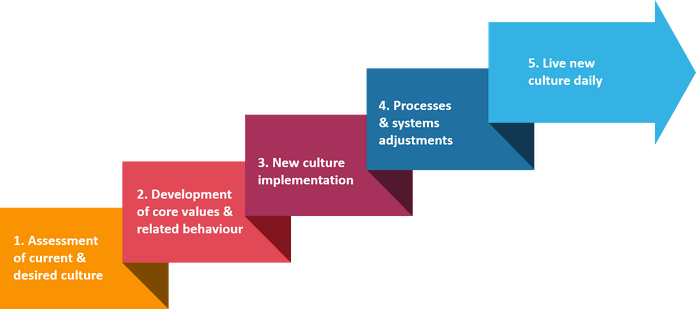Conscious Culture Transformation
What is culture all about?
We, the Conscious Leadership Academy, define culture as "how people work together in an organisation“.
Why culture matters?
Peter Drucker, the pioneer of management education, put the power of culture in a nutshell: "Culture eats strategy for breakfast“.
His quote implies that the best strategy does not work out if its implementation is not supported by sufficient collaboration. That is why highly successful organisations focus on a culture which is based on shared values.
The benefits of a values driven culture are:
- Highly engaged employees
- Increased ability to attract and retain talent
- Elevated capability to innovate
- Improved financial performance and sustainable success
- Increased customer, investor and supplier satisfaction
- Positive brand image
What is the status-quo of culture in the business world?
The Deloitte research study “Global Human Capital Trends 2016” revealed:
- 87% of the interviewed CEOs regard organisational culture as key priority
- Only 28% believe that they understand the culture of their organisation
- Only 19% are convinced that they have the right culture in place
How can culture be made visible and manageable?
In our Conscious Culture Transformation programme, we rely on the Culture Transformation Tools (CTT) developed by Richard Barrett, to make “soft facts“ of your organisation visible and measurable in a simple and swift manner.
We decided to work with CTT because they exclusively take into account the personal values your employees already bring to work as well as the values which inspire them to collaborate effectively.
The CTT help to identify what works well in your organisation and where your employees waste energy and why. This empowers you to successfully manage your organisational culture by addressing the needs of your people.
How do the Culture Transformation Tools (CTT) work?
Every individual, regardless of origin and background, has personal needs. The fulfilment of these needs is the inner driver for any chosen activity. How this activity is performed by the individual is based on his or her values. Who we are, what is important for us and how we behave, is mainly determined by our personal values. These values are measured and analysed by CTT.
In the organisational context, common values also connect people with different personalities, nationalities and educational backgrounds. Hence common values provide a solid basis for a successful culture, because they create a strong bond among people.
How is a culture transformation programme structured?
Before starting a culture transformation, it is important to point out that organisations change and people transform! That is why a culture transformation takes time and is only successful if the majority of your leaders and employees support the new culture.
During a culture transformation journey we guide you through five stages:
1. Assessment of current and desired culture:
An organisation wide online assessment is conducted to identify:
a. The common personal values of your people, to understand who will journey with you;
b. The values your people experience in the organisation today, to know your starting point;
c. The values your people desire for the future organisation, to know your destination.
2. Development of core values and related behaviour:
Based on the assessment results, your senior leaders develop the core values, the related behaviour and the message why the transformation is necessary. The common core values form the foundation of the new organisational culture and need to be in line with vision and strategy. Your employees refine the values related behaviour in a bottom-up approach to ensure an overall consistency.
3. Implementation of new culture:
Your senior leaders and trained change agents demonstrate the core values by displaying the defined behaviour as role models. Discovered areas for improvement are tackled and existing strengths are applied more consciously.
4. Processes and systems adjustments:
The new way of thinking and acting has an impact on your existing processes and systems. Adjustments have to be made in the relevant operational structures. For example, in the promotion process, the continuous demonstration of the core values becomes an additional selection criteria.
5. Live new culture daily:
To breathe life into your new culture, all leaders and employees take the core values consciously into account when making decisions and collaborating with stakeholders, internally and externally. A regular monitoring of the culture transformation progress ensures your long-term success.

